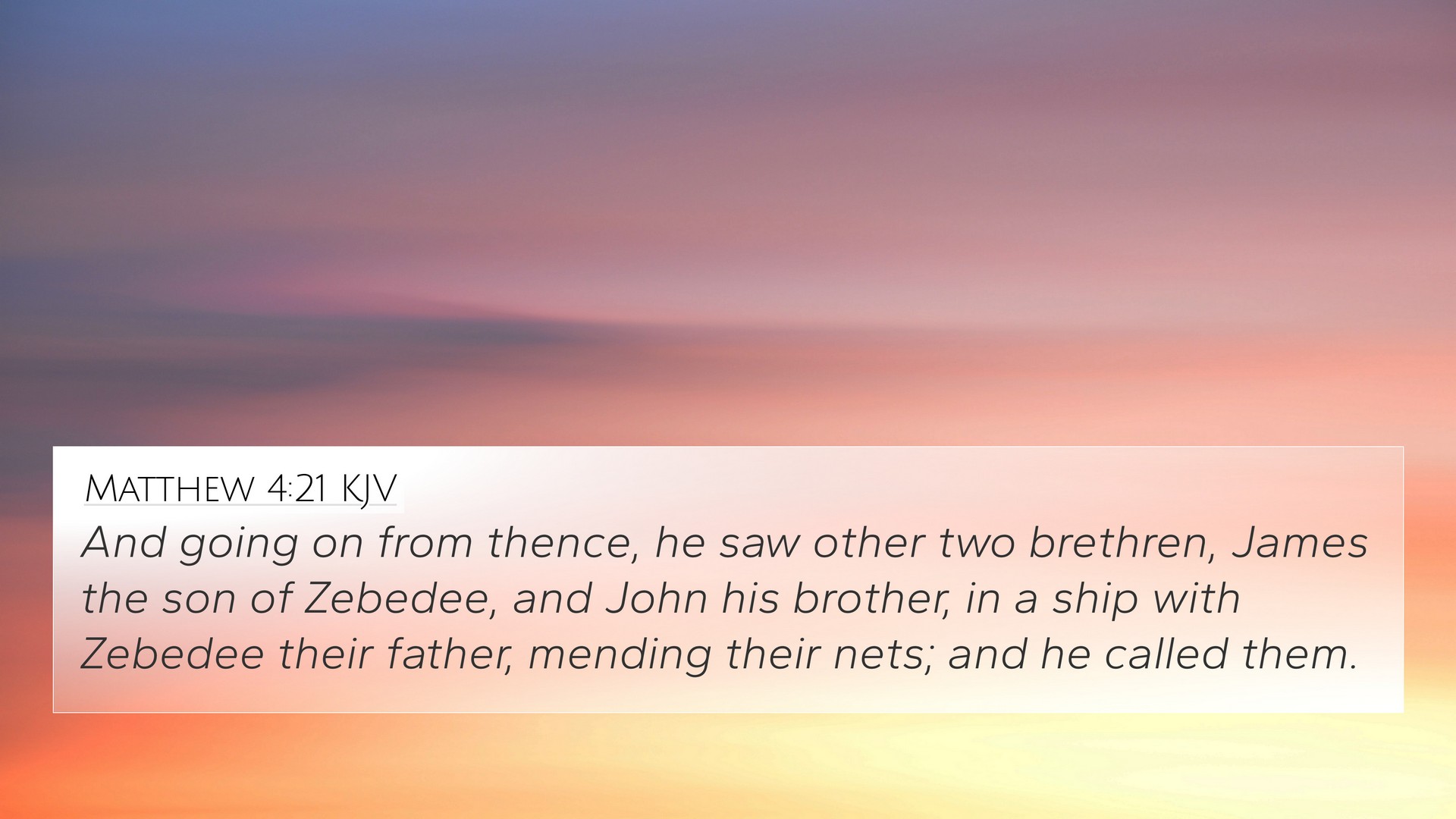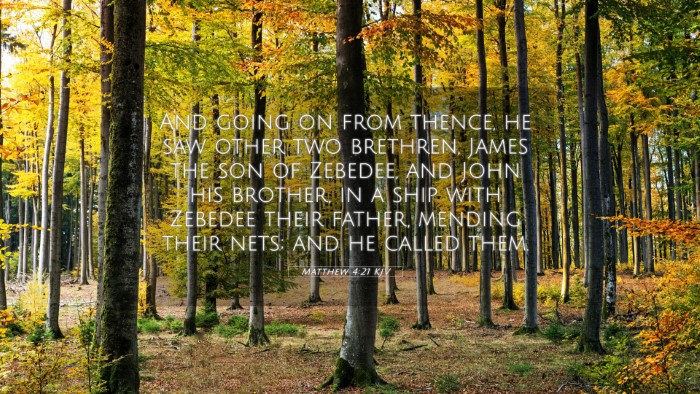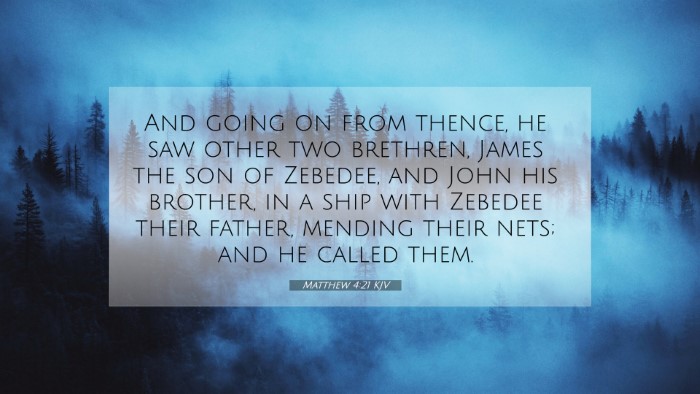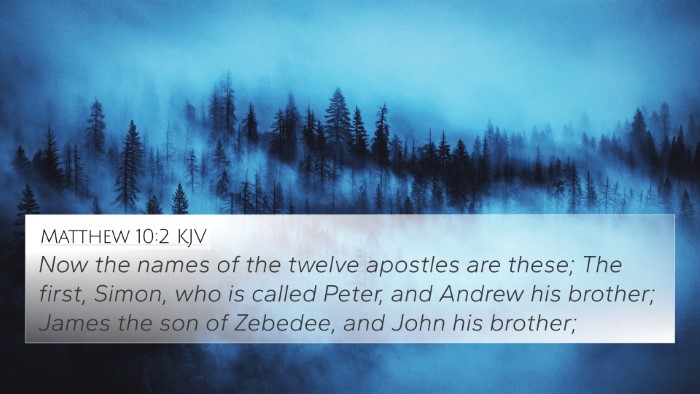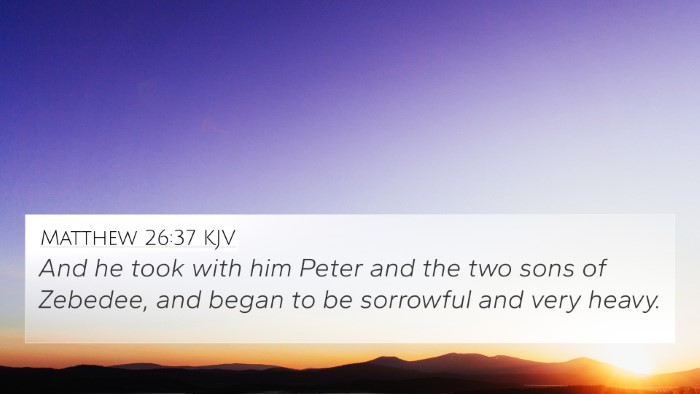Understanding Matthew 4:21
Matthew 4:21 states: "And going on from thence, he saw other two brethren, James the son of Zebedee, and John his brother, in a ship with Zebedee their father, mending their nets; and he called them."
Verse Meaning Overview
This verse describes a pivotal moment in the calling of two of Jesus' disciples, James and John. The act of mending nets signifies preparation and readiness for work—both physically in terms of fishing and spiritually in terms of their future ministry.
Insights from Commentaries
Matthew Henry:
Henry emphasizes the significance of Jesus calling ordinary men to a significant mission. He notes that fishing was not merely a profession but a way of life for these disciples, representing their commitment to God’s call. The nets signify the work and responsibilities they were leaving behind for their divine calling.
Albert Barnes:
Barnes reflects on the nature of Jesus’ call. By choosing men engaged in an everyday task, Jesus illustrates that he values all forms of labor and transforms ordinary life into an arena for divine purpose. The mention of their father, Zebedee, highlights familial bonds and earthly responsibilities that the disciples had to consider in their decision.
Adam Clarke:
Clarke points out the importance of the disciples’ obedience and swift response to Jesus’ call. He elaborates on the idea that their willingness to leave their father and livelihood showcases not just a physical act of leaving but a deeper spiritual commitment to follow Christ.
Bible Verse Cross-References
- Mark 1:19-20: This passage parallels the calling of the disciples, emphasizing their immediate response to Jesus.
- Luke 5:10: Luke provides a narrative reflecting on the nature of fishermen being called to become fishers of men.
- Matthew 4:18: Earlier in Matthew 4, Jesus calls Peter and his brother Andrew, establishing a theme of discipleship.
- John 1:35-42: John’s account includes the call of Andrew and Peter, showcasing the recruitment of Jesus’ first followers.
- 1 Corinthians 1:27-29: Paul speaks on God’s choice of the foolish and weak to shame the wise—this represents the calling of ordinary fishermen.
- Acts 1:14: This verse reflects on the continuous ministry of the apostles after Christ's ascension; it is relevant to understanding their journey from fishermen to leaders.
- John 15:16: Jesus speaks of choosing the disciples, reinforcing that their calling is divinely appointed.
- Matthew 28:19: The Great Commission highlights the transition of the disciples’ roles from followers to leaders, tasked with making more disciples.
- Isaiah 43:10: Reflects God's intention to call His servants, relating to the concept of being called for a purpose.
- Jeremiah 1:5: Signifying God’s foreknowledge and purpose for individuals, paralleling the disciples’ calling.
Connection to Thematic Bible Verse Connections
The calling of the disciples reflects key themes found throughout the Bible, particularly those of obedience, divine purpose, and the transformation of everyday life into service for God. Notably, the links between Old and New Testament themes illustrate that God has always sought to engage people in His work.
Cross-referencing and understanding these themes provide deeper insights into the nature of divine calling and the response expected from those chosen by God.
Tools for Bible Cross-Referencing
For those interested in exploring further, several tools can aid in cross-referencing Scripture. A Bible concordance allows readers to find connections between verses. Using a Bible cross-reference guide can also enhance one's understanding of thematic links across texts.
Conclusion
Matthew 4:21 serves as a profound example of Jesus' call to discipleship, encouraging readers to explore their own responses to God's call. Through effective cross-referencing and understanding the connections between related Bible verses, one can gain enriched insights into the meaning and implications of Scripture. This inter-Biblical dialogue invites believers to see their lives through the lens of God's purpose, as represented through the lives of the first disciples.
